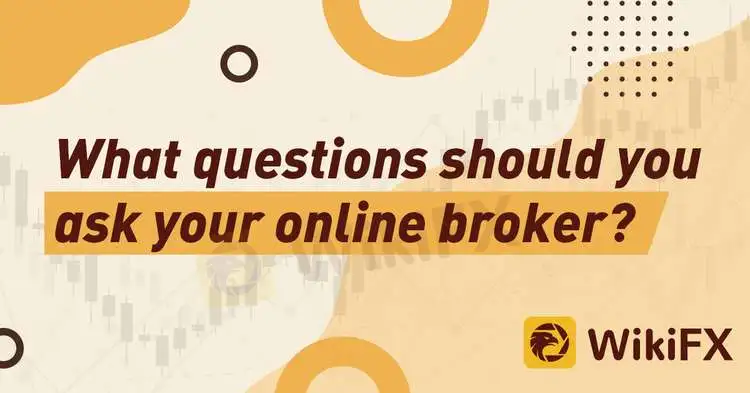简体中文
繁體中文
English
Pусский
日本語
ภาษาไทย
Tiếng Việt
Bahasa Indonesia
Español
हिन्दी
Filippiiniläinen
Français
Deutsch
Português
Türkçe
한국어
العربية
What questions should you ask your online broker?
Abstract:All online brokers are not created equal. There are significant variances in service quality, regulatory compliance, and cost. So, before you decide where to put your money, ask your broker these questions.

All online brokers are not created equal. There are significant variances in service quality, regulatory compliance, and cost. So, before you decide where to put your money, ask your broker these questions.
Do you have a financial market regulator's license?
This is a crucial point. Inquire about an over-the-counter derivatives provider (ODP) license from online brokers who sell contracts for difference (CFDs). CFDs are a sort of derivative that allows a trader to profit from changes in the price of an underlying asset without actually owning it.
Do you have a South African office that I may visit?
It is critical to have a physical presence in the area. Several brokers operate entirely online, with no physical presence. You might as well be on the moon if something goes wrong with your account. Choose a broker with a local office where you can go if you have any problems or just to get a sense of the company's culture.
How much do you charge?
On the website, the online broker should make their charge schedule available, and those costs should be straightforward to comprehend and clear. Inquire with the broker about any hidden costs.
When you buy or sell a financial item, brokers make money by charging a spread. The spread is the price differential you pay based on whether you're a buyer or a seller. That spread isn't set in stone. It changes according to the instrument and the liquidity available (how much money is moving into and out of that instrument). The lower the spread, the higher the liquidity.
Make sure there isn't a commission fee added on top of this. When trading CFDs, keep in mind that if a position is kept overnight, there is a financing charge. Most brokerages charge approximately 6% each year, which is tiny enough to go unnoticed, but be aware that these expenses will build up over time if you keep a position for a long time.
Keep an eye out for deceptive advertising.
Is the broker giving the idea that online trading is a quick method to make money without mentioning the risks? Be warned: internet trading has significant risks since you can buy financial products with leverage, which means your profits and losses are magnified. You're basically purchasing more financial assets with less money, which is terrific when the market goes your way but highly worrisome when it doesn't.
Choose a broker who does not use deceptive advertising and clearly discloses the dangers.
Is there a basic check done by the broker to verify if you can afford to invest?
If you can't afford to lose the money you're trading with, you shouldn't be trading. If you want to augment your income by trading, that's OK, but only trade with money you're willing to lose.
What kind of training and assistance do you provide to your clients?
Are there any tutorials that teach how to trade, how to interpret charts, how to put up a trade, and how to grasp the underlying factors behind market price moves that are straightforward to follow?
Is there a support center where you may get help setting up your trade? Is there a weekly webinar or coaching session available to assist clients?
Is there someone competent who will keep a watch on your trading, good or bad, and correct you when things go wrong, such as when you risk too much money in one trade? (a common reason for trader wipeout).

Disclaimer:
The views in this article only represent the author's personal views, and do not constitute investment advice on this platform. This platform does not guarantee the accuracy, completeness and timeliness of the information in the article, and will not be liable for any loss caused by the use of or reliance on the information in the article.
Related broker
Read more

Why Do You Feel Scared During Trade Execution?
Trade execution is a pivotal moment for traders. It is when analysis turns into action, and potential profits or losses become reality. However, for many traders, this moment is accompanied by fear. Why does this happen, and how can you address it?

Doo Financial Expands Reach with Indonesian Regulatory Licenses
PT. Doo Financial Futures, a subsidiary of the global financial services brand Doo Group, has secured regulatory approval from Indonesia’s Badan Pengawas Perdagangan Berjangka Komoditi (BAPPEBTI).

Investment Scams in Malaysia: Telegram Tops Scammers’ List
In the first 11 months of 2024, Malaysia recorded 5,685 investment scams, with Telegram emerging as the most commonly used platform for fraudulent activities.

WikiFX Review: Is IQ Option trustworthy?
IQ Option is catching our eye as it seems to be a trending topic. For those who want to know whether IQ Option is a reliable broker, WikiFX made this article to help you better understand this broker.
WikiFX Broker
Latest News
Geopolitical Events: What They Are & Their Impact?
Volkswagen agrees deal to avoid Germany plant closures
Top 10 Trading Indicators Every Forex Trader Should Know
WikiEXPO Global Expert Interview: Simone Martin—— Exploring Financial Regulation Change
TradingView Launches Liquidity Analysis Tool DEX Screener
MultiBank Group Wins Big at Traders Fair Hong Kong 2024
'Young investors make investment decisions impulsively to keep up with current trends' FCA Reveals
Why Do You Feel Scared During Trade Execution?
CySEC Settles Compliance Case with Fxview Operator Charlgate Ltd
Malaysian Influencer Detained in Taiwan Over Alleged Role in Fraud Scheme
Currency Calculator


